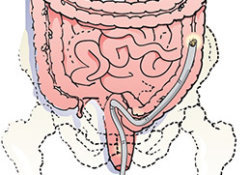
Colon cancer, also known as colorectal cancer or CRC, is a serious disease that can be prevented through early detection and treatment. Treatment options are available, but prevention is always the best option. There are several things you can do to reduce your risk of Colorectal Cancer.
What is Colon Cancer
CRC is a cancer that starts in the Colon, the large intestine. Colon cancer is the 3rd most common cancer in the United States, and it is estimated that there will be over 145,000 new cases in 2019.
Colon Cancer Prevention
There are several things that people can do to reduce their risk of developing colorectal cancer.
- Get screened regularly: Colon cancer can be detected early through screening tests such as a colonoscopy. Screening can find polyps (abnormal growths) in the colon, which may become cancerous over time.
- Maintain a healthy weight: Being overweight or obese increases the risk of CRC. Maintaining a healthy weight can help reduce the risk.
- Eat a healthy diet: Eating a diet high in fruits, vegetables, and whole grains may reduce the risk of colorectal cancer.
- Be physically active: Physically active people have a lower risk of developing Colon cancer. Exercise can help reduce the risk of other health conditions, such as obesity, that may increase the risk of CRC.
- Do not smoke: Cigarette smoking increases the risk of Colon cancer. Quitting smoking can reduce this risk.
- Limit alcohol intake: Drinking alcoholic beverages increases the risk of colorectal cancer. Limiting alcohol intake can help reduce the risk.
- Get regular screenings: CRC can be detected early through screening tests such as a colonoscopy. Screening can find polyps (abnormal growths) in the Colon, which may become cancerous over time.
- Have a family history of colorectal cancer evaluated by a doctor: People with a family history of Colon cancer are at greater risk for developing the disease. Evaluation by a doctor can help identify any increased risk and steps that can be taken to reduce the risk.
Symptoms of Colon Cancer
Colon cancer often does not have any symptoms in the early stages. However, some symptoms may indicate the presence of CRC. These symptoms may include:
- Rectal bleeding
- Diarrhea or constipation lasting more than a few days
- Blood in the stool
- Unexplained weight loss
Diagnosis
If you are experiencing any of the symptoms of colorectal cancer, it is important to see a doctor right away. A doctor will perform a physical exam and may order tests, such as a Colonoscopy, to diagnose Colon cancer.
What is a Colonoscopy?
A colonoscopy is a test that can be used to screen for CRC. A Colonoscopy allows a doctor to look inside the Colon and rectum using a long, thin tube with a camera on the end. This test can help identify polyps (abnormal growths), which may become cancerous over time. Colonoscopies can also be used to diagnose Colon cancer.
Treatment for Colon Cancer
There are many different treatments for Colorectal cancer. Treatment options depend on the stage of cancer, how healthy the person is, and other factors. Treatment may include:
- Surgery: The type of surgery depends on the tumor's location, how healthy the person is, and other factors.
- Chemotherapy: Chemotherapy is a treatment for cancer that uses drugs to kill cancer cells. Chemotherapy is often used to treat colorectal cancer that has spread to other parts of the body.
- Radiation Therapy: Radiation therapy is a treatment for cancer that uses energy from radiation to kill cancer cells.
- Targeted Therapy: Targeted therapy is a type of cancer treatment that uses drugs to attack cancer cells. These drugs are called targeted therapies because they attack only the cancer cells, not the normal cells.
- Hormone Therapy: Hormone therapy is a type of cancer treatment that uses hormones to kill cancer cells.
Conclusion
Colon cancer is a type of cancer that starts in the Colon, which is the large intestine. Colorectal cancer can often be detected early through screening tests such as a colonoscopy. Screening can find polyps (abnormal growths) in the Colon, which may become cancerous over time. There are many different treatments for CRC, depending on the stage of cancer, how healthy the person is, and other factors.
